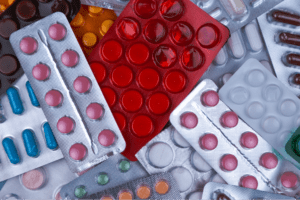A sedentary, high stress, low activity lifestyle in combination with high carb and fat diet are huge factors that contribute to preventable illnesses in the United States. In the US, the Centers for Disease Control and Prevention (CDC) that 39.8% of Americans are obese. Being obese contributes to the top killers in the US: heart attacks, strokes, and diabetes. These diseases are a result of The CDC estimates nearly 30.3 million Americans (9.4%) have diabetes. 1 out of 4 don’t even know they have diabetes. But could the obese epidemic be a side effect of toxic chemicals too?
A recent example of an increase in obesity in the US that has little to do with food, is seen with infants. Since 1980, a 73% increase in obesity has occurred in infants less than 6 months old. This is important to note as infants do not eat McDonald’s french fries. Infants are also affected by chemicals more because, pound for pound, their exposure is higher than adults. It’s also seen that chemicals banned for over a decade are being passed through the umbilical cord. This shows that you’re being exposed without realizing it.
But the big question is, can these toxins cause weight gain?
Why You Should Care
 If you’re thinking that no one in your family has heart disease or diabetes or is overweight, take a look at how those numbers have exponentially grown over the years. It could be hitting close to home for you soon. Multiple examinations and studies* have shown a relationship between toxins and diabetes. Your liver filters out chemicals and, in today’s society, it’s bombarded by toxins in your beauty products, food, water, and air. They can cause slow down your metabolism, causing weight gain. It’s a lose-lose situation.
If you’re thinking that no one in your family has heart disease or diabetes or is overweight, take a look at how those numbers have exponentially grown over the years. It could be hitting close to home for you soon. Multiple examinations and studies* have shown a relationship between toxins and diabetes. Your liver filters out chemicals and, in today’s society, it’s bombarded by toxins in your beauty products, food, water, and air. They can cause slow down your metabolism, causing weight gain. It’s a lose-lose situation.
Heavy metals are something else your body filters out. You may not consider them as you hear of things like lead already being banned. But the truth of the matter is, in the US, the government has a history of not banning things until the damage is done (look into Erin Brockovich & the Flint Michigan Water Crisis). These heavy metals can be found in your dental fillings (yes, the white ones too), water, deodorant, hydrogenated cooking oils, vaccines, and fish. They act on the body by impairing glucose control, decreasing cellular metabolism, and increasing inflammation.
Other Signs of Toxins That Cause Weight Gain
- Feeling tired
- Headaches
- Acne
- Gas/Bloating
- Hormonal imbalances
- “Beer Gut”
- Aching joints
What To Do
First things first, stop using products that contain toxic chemicals. Next, don’t ingest these chemicals via cheap, processed foods. Eat foods with the fewest ingredients listed or with no label at all. This means, eat more plants! They contain antioxidants and phytonutrients. These are a protective defense plants have to prevent infection and pests. Organic foods must fight off pests, infections, and endure periods of draught on their own. As a result, they evolve and contain a greater concentration of these illness fighting properties.
Plants also help your body flush out toxins by binding with them in the gut. This is why it’s important to increase your water intake when detoxing.
Some great detoxifying foods are:
- Cruciferous vegetables
- broccoli, collards, kale, brussels sprouts, turnips, kohlrabi, mustard greens, bok choy, argula, chinese cabbage, watercress
- Curcuminoids
- turmeric and curry
- Green tea
- Foods contains sulfur
- garlic and onions
Make sure you’re sweating! If you’re using traditional anti-perspirants, you can be putting numerous toxic chemicals onto your skin. They work to prevent you from sweating, which your body needs to do. Native Americans used sweat lodges for physical and spiritual purification. When you sweat, your body can naturally get rid of some of the toxins and it also boost your immune system! The Environmental Protection Agency has also shown that sweating increases the amount of heavy metals your body excretes.
Are you concerned about toxins causing health problems? Have you considered that toxins cause weight gain?
Disclaimer: This is not meant to be used to treat or diagnose any illness or disease and not meant to be used as healthcare advice. It’s only meant to be used for educational purposes.
*Lee DH, Lee IK, Song K, et al. A strong dose-response relation between serum concentrations of persistent organic pollutants and diabetes: results from the National Health and Examination Survey 1999-2002. Diabetes Care. 2006;29(7):1638-1644.
*Fujiyoshi PT, Michalek JE, Matsumura F. Molecular epidemiologic evidence for diabetogenic effects of dioxin exposure in U.S
*Sharp D. Environmental toxins, a potential risk factor for diabetes among Canadian Aboriginals. Int J Circumpolar Health. 2009;68(4):316-326.
*Turyk M, Anderson H, Knobeloch L, Imm P, Persky V. Organochlorine exposure and incidence of diabetes in a cohort of Great Lakes sport fi sh consumers. Environ Health Perspect. 2009;117(7):1076-1082.

Leave a Reply